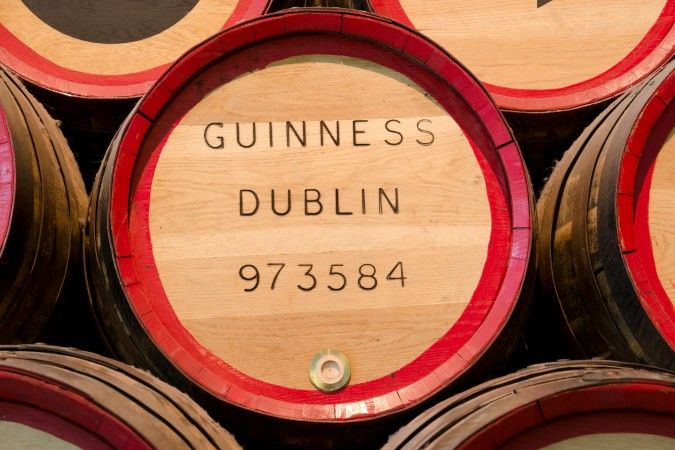We’d probably all like to leave a positive mark on history; a legacy that indelibly links your name to something exciting, maybe even game-changing, and of significance to future generations to come. I’m not sure the lasting legacy of the foremost patron saint of Ireland, St. Patrick, is one he would have foreseen: March 17, a day that proudly presents itself as the perfect opportunity to party, is Pat’s legacy echoing through the ages.
Each year, St. Patrick’s Day falls on the day the saint was said to have passed away back in 461AD, and each year a glass is raised in his honour and to that of the Emerald Isle. Many use it as an opportunity to get tanked up, but it’s also worth treating the day as a showcase to a place known for the richness of produce forged from its verdant countryside. On the plate, Dublin Bay prawns, Galway oysters or hearty Irish stew show how rich both the land and the sea can be. But it is in the glass where Ireland excels.

Of course, a pint of the black stuff is instantly recognisable as one of Ireland’s most beloved drinks, but away from the beer taps and bar tops, where pints of Guinness patiently wait to be topped up, there is a raft of world-class spirits proving that, when it comes to drinks, Ireland is no one-trick-pony.
The obvious place to start is with whiskey, the true Irish spirit. The origins of distilling are as dark as a pint of stout, but it is pretty well established that the art of distillation would have made its way to Scotland via the Celts from Ireland. And today, the oldest-licensed whiskey distillery in the world is to be found on the island’s north coast.
A stone’s throw from the Giant’s Causeway is Bushmills distillery, an elemental place which has become the island’s stalwart single malt distiller. The site has held its licence to distil since 1608. Priding itself on a similar production process to Scotch, Bushmills uses malted barley as its starting point, adding a third stage of distillation to Scotland’s usual two. The result is a whisky with additional smoothness, making it seriously easy to drink. However, Bushmills is not only a great example of a heritage distillery; it is also one that is globally respected for producing first-class spirits, even 414 years after its licence was first granted.


Where Bushmills flies the flag for Irish single malts, the overall standard- bearer for Irish whiskey has to be Jameson. Founded in Dublin – where you can now visit the incredible Jameson Distillery Bow St tour – the whiskey is today made in New Midleton Distillery, near Cork, alongside stablemates such as the fantastic Redbreast, Green Spot and Blue Spot whiskeys, and the super Midleton Very Rare, the pinnacle of Irish ‘single potstill’ whiskey making. What sets this team apart from the single malt made in the north is the use of both malted and unmalted barley, pulling the spirit in a different flavour direction and giving it a complexity not seen in other areas of whiskey production.
Where whiskey might encapsulate the Irish attitude, it is gin that is bottling the land
Alongside whiskey, Irish gin is drawing on the isle’s rich distilling history as well as on an abundance of local botanicals that really show off the verdurous qualities of the countryside. Where whiskey might encapsulate the Irish attitude, it is gin that is bottling the land. Distilled on the south-west coast of Ireland in County Kerry, Dingle Original Gin draws complexity of flavour from locally foraged botanicals, including rowan berry, fuschia, bog myrtle, hawthorn and heather. The distillery even uses water from its own well to bring the gin down to bottling strength.


Another cracker, this time from towards the north of the island, is Shortcross Gin, produced in small batches using a custom-made copper still and featuring botanicals sourced from the gardens and forests of the surrounding Rademon Estate, such as fresh apple (picked from the walled garden), elderberry and wild clover (a great way to add the shamrock to your celebrations).
So if you’re looking to raise a glass to the Irish spirit this St Patrick’s Day, look no further than to Irish spirits themselves, a legacy for which the country can be rightly proud.
What Joel has been drinking…
- One of the hidden gems of Scottish single malt must surely be Tobermory Distillery on the Isle of Mull. It is hemmed in by sea and hills, making it one of Scotland’s smallest historical producers. Its newly released, limited-edition 24-Year-Old expression shows off just how good whisky from this remote distillery can be. Take a chance on its 12-year-old, too, for a more approachably priced introduction.
- Valentine’s Day and its red roses might be a distant memory, but I’m keeping the mood alive with one of my favourite bourbons of all time, Four Roses. Its single barrel offering is just amazing, but I’ve switched to the brand’s Small Batch Select, a non-chill filtered bourbon bottled at 52%, so that it is rich and unctuous with incredible flavour. I’m drinking it over ice, but it also makes an awesome Old Fashioned.
- There’s a new vodka in town: X MUSE, the world’s first blended barley vodka, and I’ve been using it in a cool, crisp Martini. The liquid itself is viscous and full of notes of vanilla and sweet cream, making it ideal for chilling down and mixing into a 50/50 Martini with a good herbal, dry vermouth, such as Dolin. Garnish with a twist of lemon, and you’ll thank me for suggesting such a vivifying drink.








